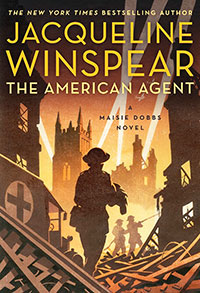
By Dennis Fischman
If you picked up this book and haven’t read any Maisie Dobbs novels before, do not worry: Jacqueline Winspear makes a point of explaining the characters, their relationships, and some of their past history each time. In some cases, it comes up in dialogue; in others, in narration; in yet others, by implication, but it’s easy to follow.
That being said, there’s an advantage to reading this series in order, from the beginning, and that is that it’s like reading the biography of a woman with a fascinating life. Maisie Dobbs starts out as the daughter of an impoverished widower, goes into domestic service with the aristocratic family next door, and essentially gets discovered by them as a bright teenager, a voracious reader, and a person of conscience. She leaves them to work as an ambulance driver in WW I.

The American Agent, by Jacqueline Winspear.
HarperLuxe, 2019,
489 pages.
When she returns to England, they introduce her to Jewish psychologist and private investigator Maurice Blanche, who teaches her the habits of mind and the tricks of the trade that make her a detective. (She also gets spiritual instruction from HIS teacher, a Sri Lankan man named Khan, who helps her put up with Maurice’s peculiar quirks.)
Over the course of eighteen books, we watch Maisie grow from a sad young woman to an independent investigator, and we see her love life, from the man she wanted to marry who comes back from the Great War permanently brain injured to some important affairs, to at least two marriages. She becomes part of the aristocratic family, and she hires people to work for her detective agency (and we learn about all those characters and their life struggles, too), without losing her common touch.
So, one reason to read The American Agent is as part of that continuing biography.
Another reason is that it’s a revealing historical novel. In this book, it’s WW II, London is under the Blitz, and Maisie and her dear friend Priscilla are recapping their service as ambulance drivers, this time at home, at night, when the bombs are falling. It’s 1940, and while the U.S. is quietly supplying the British with materiel, a powerful faction on this side of the pond wants America First, isolationism, and cooperation with dictators in Europe. (Sound familiar?)
As the title of the book implies, Maisie is going to be conducting an investigation into the death of an American war correspondent, Catherine Saxon, with the assistance of an American FBI agent, Mark Scott (whom readers met in the previous book of the series). Her father, a U.S. Senator, is one of those isolationist types. He disapproves of what his daughter and correspondent Edward R. Murrow are doing: making the war in Europe real, and the victims, human, in the eyes of voters in the U.S.
There are also some insights into what a bastard U.S. Ambassador Joseph Kennedy was. (Yes, the father of JFK and RFK. Both of them had their repressive sides, but they were nothing like their hate-filled, corrupt father!)
The investigation itself is hampered by the need to visit all the sites and conduct all the interviews before curfew falls every night. Maisie’s attention is also divided because she has taken in a war orphan whom she is applying to adopt. How can she pay attention to anything else, she feels, from her job to her new romance, while this little girl is worrying about losing the people who love her all over again? In the end, the solution to whodunnit makes sense (and the author plays fair by giving us all the clues that Maisie sees), but it’s not that important. It thematically resonates with what else is going on in Maisie’s life: that’s what matters.
So, read this book for the characters, the setting, the place and time, and accept that the detective work is there as a scaffolding for the real story.
Dennis Fischman is a member of the Somerville Public Library’s Mystery Book Club and an inveterate reader.















Reader Comments